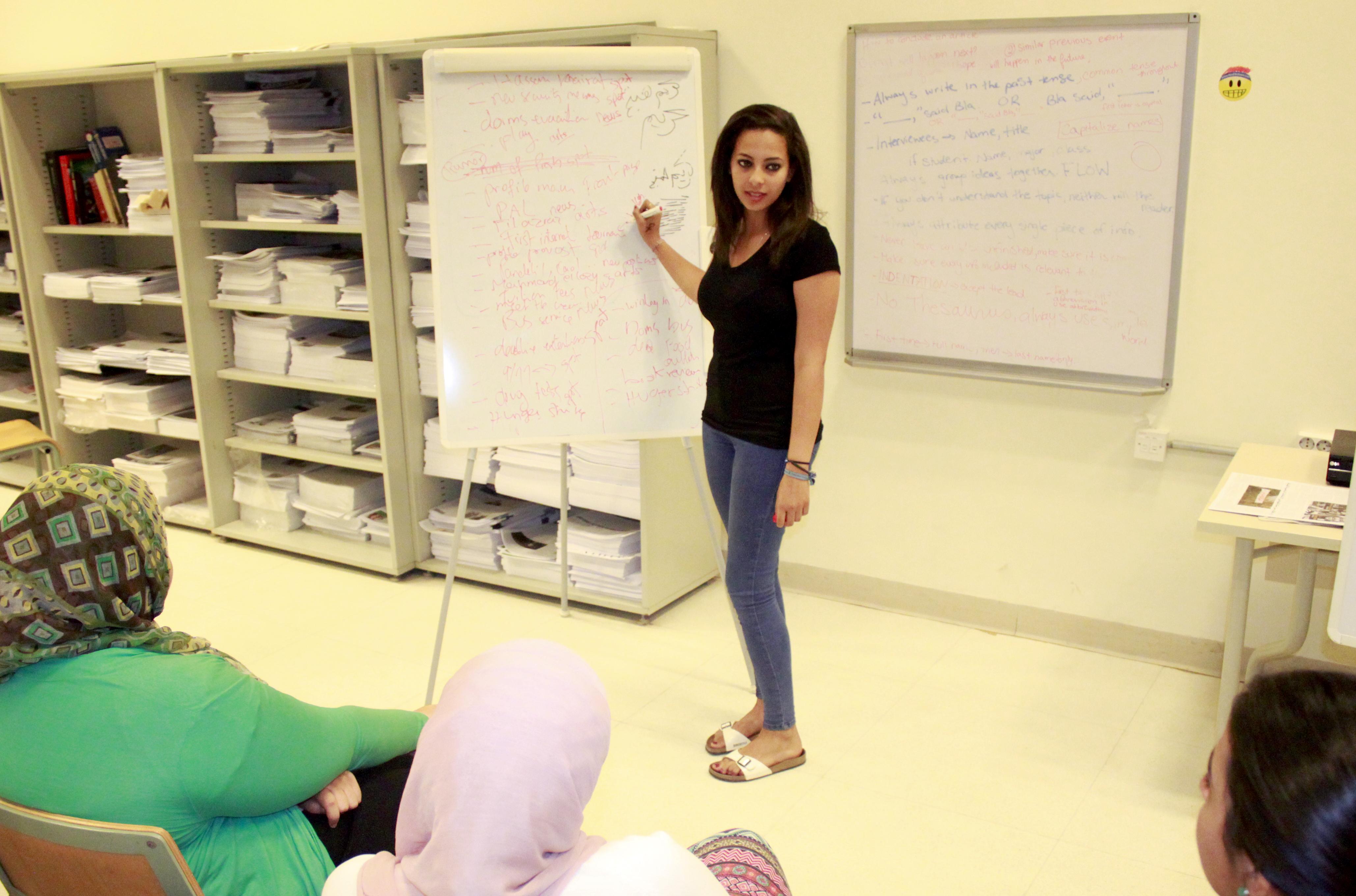AUC Senate: Helping Solve AUC’s Problems and Challenges
By: Maya Abouelnasr
@EmEn1125
The Senate is an important entity at AUC, overseeing a plethora of committees that ultimately seek – and serve – the interests of all constituent parties on campus. The Caravan sat down with Chair of the Mechanical Engineering Department and University Senate Chair Hanadi Salem to discuss the body’s role on campus, her role during the pandemic, and her hopes for the Senate’s future.
Below are excerpts from the interview.
The Caravan: Could you please elaborate on the role of the Senate on campus?
Salem: The AUC University Senate represents all constituencies on board including students, faculty, and staff. The University Senate has a chair, vice-chair, and a number of committees. Committees of the Senate deal with the affairs of students, faculty, and staff. We also have the Curriculum Affairs committees which deal with reviews, approves, and monitor curricula and programs and are responsible for the contents of the AUC catalog.
The Academic Affairs Committee reviews, approves, and monitors standards of research and instruction, policies concerning grading, and other matters pertaining to the academic mission of the University. The Student Affairs Committee, reviews, approves, and monitors policies concerning the admission and academic performance of students and is responsible for standards for admissions, scholarships, student academic performance, graduation requirements, and honors.
The Faculty Affairs Committee develops, reviews, approves, and monitors policies and other matters relating to all faculty personnel matters and is responsible for the contents of the faculty handbook. The Administrative Affairs Committee, reviews and monitors matters related to the administration of the university’s safety, planning, and practices, and deals with the general staff issues, policies, and procedures that are issued at the university level that impact the students, faculty, or staff.
There is also a committee that deals with grievances and another working on the budget review with the financial officers at AUC. Finally, there is the Executive Committee (EC) of the Senate, membered by the chairs of the senate committees, two senators elected at large, and the senate secretary and manager. The EC organizes and originates all matters pertaining to Senate organization, by-laws, and operational procedures.
So, as you can see, the University Senate is a representative council of the university faculty, with the participation of students, staff, and administration, which ensures faculty participation in governance and in the discussion of issues important to the university community. The Senate provides a forum for considering matters directly related to the well-being of the AUC community and consult and advise the administration with decision-making.
And your role as the Senate Chair, overseeing all of these committees …
The Senate Chair manages the day-to-day activities of the Senate and in consultation with the vice-chair and the executive committee, and sets the agenda for the executive committee meetings and the Senate’s activities, and, of course, sets the agenda for the Senate meetings. The Senate Chair is also in direct communication with the President, Provost, and other senior leadership of the university and also with students, faculty, and staff.
The Senate Chair receives faculty grievances and is the one who disseminates the input or feedback that comes from the various constituencies within the university. For example, a policy that is proposed by the administration that affects the students is communicated with the Student Affairs Committee through the Chair of the Senate. Similarly, the Chair communicates other matters with the various senate committees for studying and then reporting to the EC and then to the whole Senate.
The Senate Chair along with the Vice-Chair meet regularly with the President and Provost.
From what I understand, you took over this position during the pandemic. What have been some of your biggest victories and challenges during this period? Especially taking into account the pandemic, which I suppose must have been quite a demanding task.
Yes, this is my second [academic] year. There were several related and unrelated challenges. The Senate was in close cooperation with the students and administrators, trying to resolve issues related to grading policy during the forced online instruction modality.
One of the victories achieved was that we gained back the trust of the student body and strengthened our ties with them. The students realized the role of the Senate not being only concerned with faculty but rather concerned with students’ well-being as well. And the same applies to staff.
One of the major challenges was the raised controversial issues that stopped us from moving forward. There were lots of discussions, negotiations trying to navigate through the policies and procedures imposed by the Administration without consultation with the Senate.
Being part of the Senate since spring 2017, as a Chair of the Faculty Affairs Committee, with all the issues related to the Faculty Handbook, I was in the middle of all the discussions and negotiations aiming to solve the issues related to the faculty benefits, frozen salaries of staff and faculty, other issues that were related to policies issued without consultation with the Senate, which has negatively affected the whole community.
The transition from being the faculty affairs committee chair and then the vice-chair – I think this was in spring 2019 – and then going into the academic year of 2020-2021 into the Chair actually was a smooth transition. Maybe this was part of the reason why I was elected as the chair of the Senate.
As you might be aware, a Senate Chair is elected by all senators who represent all academic units within AUC and is also elected by graduate and undergraduate students and staff senators. This reflects the trust and confidence of the faculty, staff, and students for which I am really honored, proud and grateful. The Senate is very optimistic, in fact, with our new president, we are confident that we will move forward toward the aspired AUC, the “Harvard of the Middle East and Africa”.
There have been a lot of concerns this semester about the return, wherein a lot of people have been very happy, but then a lot of people have also been very fearful and worried, especially as the numbers of infections have gone up. What has been the general consensus that you’ve observed among the faculty and community generally?
Definitely, the priority of AUC, being an academic institution, is to deliver the highest quality of education to the students. I refer to students as a “trust”, not as a “customer”. The reason I’m calling them a “trust” is because their parents have entrusted us with their sons and daughter to deliver them with the best education and to produce an exceptional generation who is ready to serve society and to lead outstanding careers locally and regionally.
Although, as a university, we were one of the best, if not the best, which was able to convert from the regular face-to-face instruction modality to the online suddenly when the closure occurred back in March 2020. In my perspective, whatever the best quality of education was delivered online, it’s not comparable to the quality delivered face-to-face. Students who haven’t experienced the exquisite life, and the in-person interaction with their faculty and colleagues at AUC have, in fact, missed the best time of their life.
Coming back to campus with a full face-to-face instruction has been perceived very positively by most of the faculty and students. We are aware that this must have been tough for a number of faculty who are classified as “high risk” or have a close family member who is also at high risk. I can understand their frustration. But at least we have to try our best to maintain face-to-face teaching because again, it reflects on the quality of education.
Some faculty can provide their courses online and they see that they’re not missing any of the quality of education delivered to the students, which of course depends on the nature of the course and the program.
Currently, the AUC Scientific Committee, chaired by Dr. Hassan Azzazy, is working on identifying high-risk cases. This is based on, of course, published data. Based on that, the President, Provost, and the Senate will be working together on identifying the procedure to handle the “high risk” cases who feel frustrated about being exposed to infection by COVID-19.
So, I encourage all faculty members to teach face-to-face, but also I encourage all students to MASK UP. Our students – who are not wearing masks, thinking that they are immune against infections because they’re vaccinated and young, need to understand that they are exposed outside of the university to people who are not vaccinated, and they might hurt themselves.
They might hurt their parents and at the same time, they might hurt staff or faculty members who are older in age and might be easily infected. So, again, I hope that the students think of their well-being and the same for others.
What is your personal outlook as far as the Senate is concerned for the next semester and how does having a new president factor in?
The Senate as a whole – I’m speaking now on behalf of the whole Senate – we feel very optimistic about having President Dallal on board. He has a very strong academic background. He understands and appreciates all about academia and has vast experience in leading academic institutions. With his experience and wisdom, we will solve all problems and we will regain the glory of our AUC.
The Senate Chair, the Executive Committee of the Senate, and the whole Senate met with the President several times and there has been continuous communication with the President and Provost concerning the way forward. There are many challenges that AUC is facing, internal and external, which are the focus of the current administration and the Senate.
The University Senate is available to help and support the President and the Provost to navigate through those challenges. Examples of priorities are quality of education including AUC’s reputation and perception by the community.
These include asking ourselves, ‘What could be done to increase the visibility of AUC… the edge of AUC? What [does] AUC provide that is unique compared to other institutes, locally and regionally? What does AUC provide that is not provided in terms of quality of education compared to other universities?’
Recruitment of the best students is one of the key items that has been worked on by the Provost and the President. On the academic level, [there is] revisiting the current programs [and] whether we need to introduce modernized or other programs. Student life is also of major concern, including the enhancement of their experiential learning and activities on campus. This is in addition to identifying the challenges of the various supporting processes at AUC to facilitate the educational and academic mission.
[There is a] need for supporting research to improve the university ranking – the QS Ranking. Accordingly, many of the ongoing reforms and activities listed are only part of the initiatives led by President Dallal and the Provost. The University Senate is in full support of all those initiatives and is currently working closely with the administration and the various offices. With the cultivated trust, transparency, and shared governance, we are optimistic about the flourishing future of AUC.
What are your hopes for the Senate’s future in terms of AUC governance? What impact do you hope the Senate will have in ten years?
Senates at US universities- many of them are advisory to the administration, and others are part of the decision-making process. Regardless of the role of the Senate being advisory or decision-making, it represents the vibe of the students, faculty and staff, hence consultation of the Senate is very important.
Hence, with the support of the community of AUC, the University Senate will always have a significant and profound contribution to the institute. The University Senate is and will remain an important forum for communication among the university constituencies within a context of mutual respect and shared governance.




